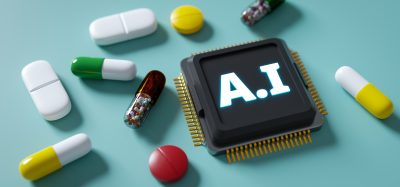Beyond the hype: a veteran’s honest assessment of AI in drug discovery – Part 3
Posted: 28 August 2025 | Dr Raminderpal Singh (Hitchhikers AI and 20/15 Visioneers) | No comments yet
AI is starting to transform drug discovery, but progress is still slow and big challenges remain. Thibault Géoui explores the gaps, hurdles and breakthroughs needed before it can truly change pharma R&D.


In Part 2, we looked at the breakthroughs and new platforms that are reshaping pharmaceutical R&D. Part 3 turns from possibility to pragmatism. Géoui offers a candid reality check on where AI in drug discovery really stands today, highlighting the adoption gap, cultural hurdles and organisational challenges that must be addressed before the technology can deliver real-world impact.
The numbers don’t lie: early days of adoption
Despite his optimism about AI’s long-term potential, Géoui provides a sobering assessment of where the technology currently stands and what it will take to achieve meaningful impact. His numbers tell a story of very early adoption:
“Boston Consulting released a paper1 in 2024 looking at how many drugs in preclinical and clinical phases came from AI platforms. In clinical phase, there were 67; in preclinical, around 160 to 170. This corresponds to approximately 0.1 percent of the overall pharma pipeline.”
Biomarkers aren’t just supporting drug discovery – they’re driving it
FREE market report
From smarter trials to faster insights, this report unpacks the science, strategy and real-world impact behind the next generation of precision therapies.
What you’ll unlock:
- How biomarkers are guiding dose selection and early efficacy decisions in complex trials
- Why multi-omics, liquid biopsy and digital tools are redefining the discovery process
- What makes lab data regulatory-ready and why alignment matters from day one
Explore how biomarkers are shaping early drug development
Access the full report – it’s free!
“If you look at preclinical compounds and take all pharma companies, there are approximately 15,000 preclinical compounds. So we are at the very beginning of this exponential curve.”
Even if these AI-developed compounds prove successful – which remains to be demonstrated – the path to statistical significance will be long.
“To have 1,000 compounds go through an AI platform and then into the clinical phase will take time. Even very successful companies like Insilico Medicine have only 20 or 30 assets. It will take five to ten years before we can actually say whether it works or it doesn’t.”
The technology used to create the compounds now in Phase II is already old-school AI. Technology is progressing so quickly.
But Géoui identifies an even more fundamental challenge: the mismatch between AI’s rapid evolution and pharmaceutical companies’ need for stable, validated processes.
“The technology used to create the compounds now in Phase II is already old-school AI. Technology is progressing so quickly, week by week, and this is very new for pharma, where companies really struggle. Typical pharma companies are not agile – they are not tech companies.”
Tech-bios vs pharma: different rules of the game
This creates a particularly complex challenge for the new generation of AI-native biotech companies.
Drug development isn’t software. You can’t just ‘move fast and break things’ when lives are at stake.
“Many of these ‘tech-bios’ began in silico – before they even had a lab – and are inspired by the agile, iterative mindset of the tech world. But drug development isn’t software. You can’t just ‘move fast and break things’ when lives are at stake. While technology is playing an increasingly critical role in pharma R&D, agility in this context means something different: it’s about navigating uncertainty with speed without compromising on validation, regulatory rigor, or patient safety. The tension lies in balancing tech-driven innovation with the realities of biological complexity and clinical accountability.”
The rapid pace of AI advancement exacerbates this challenge. Transformer models may already be giving way to diffusion models and other architectures. Automated chemistry platforms are advancing rapidly, while knowledge graph technologies continue to evolve. This creates a moving target for companies trying to build stable, validated drug discovery platforms.
It’s not just tech, it’s people
In a previous role, Géoui witnessed these challenges firsthand.
“Most traditional pharma companies are not structured – organisationally or departmentally – to leverage AI. To do so, data must be produced in a certain way, and you need people who are bilingual: those who understand both tech and science.”
Data must be produced in a certain way, and you need people who are bilingual: those who understand both tech and science.
“We had a partnership with an AI company. The AI company was giving us lists of compounds that were sent to our medicinal chemists. There was a lot of work to get the AI people and the medicinal chemists to actually talk together, understand each other, consider that what one is doing is worth trying in the lab, and then produce the data and send them the data in a very fast iterative way.”
The human element proves crucial.
“Most of the time, it’s not a tech problem; it’s a people problem and changing the way you’ve done something for a long time.”
This resistance to change seems particularly puzzling given the industry’s tolerance for failure.
No one gets fired in pharma because they try a project and it fails, because every program has a 95 percent failure rate. But people are also very reluctant to try something different. What’s the worst that can happen? It fails, like it fails all the time.
“No one gets fired in pharma because they try a project and it fails, because every program has a 95 percent failure rate. But people are also very reluctant to try something different. What’s the worst that can happen? It fails, like it fails all the time.”
Géoui reserves particular criticism for industry veterans who celebrate AI failures.
“I hate when I hear industry veterans almost cheering when an AI-developed drug fails. If you don’t like it, fine. What is it that you’re offering – given the status, speed and cost of the industry today – that will bring us to curing all diseases?”
Waiting for breakthroughs to shift mindsets
Looking ahead, Géoui predicts that change will require repeated successes from AI-native companies.
“It will take a couple of breakthroughs for people to actually think, ‘OK, I need to change how I’m doing things.’ If we start to see repeated success with Insilico Medicine, Recursion, InSitro, Xaira, Valo Health, and Isomorphic Labs – repeated Phase III success – that will shake things up, and it might even shake the model.”
This shakeup might force large pharmaceutical companies to reconsider their entire approach to R&D.
“It’s forcing pharma to rethink how they engage, how they use technology and how they staff their organisations. They don’t know where to put AI: first it goes under IT, which isn’t science; then they put it under science, but soon realise they still can’t get people to work together.”
The wish list: end-to-end simulation
When pressed for his ultimate wish list for the technology sector, Géoui’s answer reflects both ambition and realism:
“End-to-end simulation of diseases and drugs. Really being able to simulate and maybe rethink the whole process – to rethink the entire R&D cycle in light of what we can do today with complex thinking enabled by AI. Rethink it and simulate it at the system level – think Asimov’s Psychohistory applied to drug R&D.”
However, he acknowledges the cyclical nature of technology investment in pharmaceutical R&D.
There are hundreds of AI drug companies. We don’t need 100; we need a few that actually work.
“I hope that when the bubble bursts – because it will, like every bubble – and consolidation follows, we still keep the momentum. There are hundreds of AI drug companies. We don’t need 100; we need a few that actually work.”
The path forwards, according to Géoui, requires patience, realistic expectations and a fundamental shift in how pharmaceutical companies approach both technology adoption and organisational design.
The technology may finally be capable of handling the complexity that has stymied previous innovations but realising that potential will require overcoming very human challenges around collaboration, change management and the courage to fundamentally rethink established processes. For an industry that has struggled with productivity for decades, AI offers genuine hope – but only for those willing to do the hard work of transformation rather than simply adding another point solution to an already complex system.
Missed the beginning? Go back to Part 1 – Beyond the hype: a veteran’s honest assessment of AI in drug discovery
References:
- KP Jayatunga M, Ayers M, Bruens L, et al. How successful are AI-discovered drugs in clinical trials? A first analysis and emerging lessons. Drug Discovery Today [Internet]. 2024 Jun 1;29(6):104009. Available from: https://www.sciencedirect.com/science/article/pii/S135964462400134X


Thibault Géoui bridges the worlds of science, data and technology to help life sciences organisations bring better products to market – faster and smarter. With 20 years of experience in drug R&D and a passion for FAIR data and AI, he has led major initiatives such as QIANGE, Elsevier, Charles River laboratories and today at Zuhlke. Through his work, Thibault guides pharma and tech leaders in aligning data strategies, refining value propositions and accelerating digital transformation. A PhD in structural biology and an MBA back his systems-thinking approach, while his writing and coaching bring complex ideas down to earth – with a touch of humour and a strong belief in human connection.
Related topics
Artificial Intelligence, Big Data, Bioinformatics, Clinical Trials, Computational techniques, Drug Development, Drug Discovery, Drug Discovery Processes, Machine learning
Related organisations
Hitchhikers AI and 20/15 Visioneers, Zuhlke








